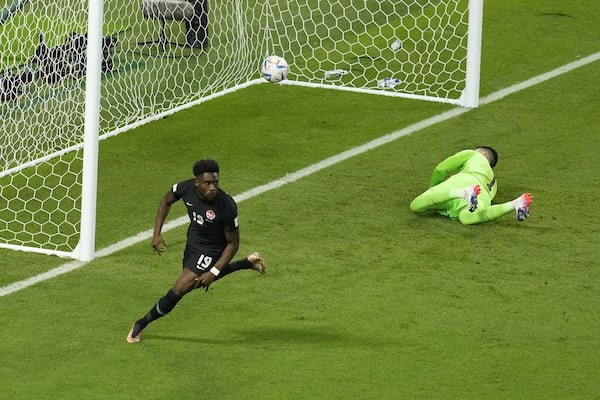
Canada's Alphonso Davies scores his side's opening goal during the World Cup group F soccer match between Croatia and Canada, at the Khalifa International Stadium in Doha, Qatar, on Nov. 27.The Canadian Press
The morning after Canada’s FIFA World Cup dreams came crashing down with a 4-1 loss to Croatia, the Toronto Stock Exchange opened on a dour note.
World markets, to be fair, were jittery on Monday on news of protests in China against COVID-19 lockdowns and resurgent worries about slowing global growth. The S&P 500 fell 1.54 per cent on Monday, while the Dow Jones Industrial Average was down 1.45 per cent.
But could the 0.8-per-cent drop of the TSX Composite Index have anything to do with the Canadian men’s team getting trounced on a soccer pitch in Qatar?
World Cup brings traffic boost to restaurants and bars
Over the past 20 years, economists have debated the impact of major sporting events on stock market returns. Does the agony and ecstasy of sports fans affect investment decisions? For economists who believe that markets are moved by emotions and narratives as much as by rational analysis, World Cup soccer provides an ideal case study.
“It is hard to imagine other regular events that produce such substantial and correlated mood swings in a large proportion of a country’s population,” Alex Edmans, currently a professor of finance at the London Business School, wrote in an influential 2007 paper on the impact of major soccer matches on stock markets.
Prof. Edmans and his co-authors examined hundreds of international soccer matches between 39 countries from 1973 to 2004. They found that the elimination of a men’s national team from a major international tournament tended to lower the country’s stock market returns the next day by 38 basis points. (A basis point is one-hundredth of a percentage point).
Elimination from the World Cup, the most important tournament of all, had an even more pronounced effect, lowering next-day stock market returns by 49 basis points. On the flip side, the researchers found no evidence that markets responded positively to wins.
“The psychology literature documents a significant difference in the behaviour of fans following wins and losses,” Prof. Edmans and his co-authors wrote. “Specifically, while an increase in heart attacks, crimes, and suicides is shown to accompany sporting losses, there is no evidence of improvements in mood of a similar magnitude after wins. This asymmetry suggests that we should observe a greater effect after soccer losses than after soccer wins.”
A Bank of Canada research paper, published in 2014, found that investors react to World Cup matches in real time, not just the day after – assuming the match is played during market hours.
Michael Ehrmann, who was a research director at the Bank of Canada at the time, and is now head of the monetary policy research division at the European Central Bank, looked at the behaviour of a cross-listed stock, STMicroelectronics NV, during the 2010 World Cup in South Africa.
Because the semi-conductor manufacturer is listed on both the Paris stock exchange and the Milan stock exchange, Mr. Ehrmann and his co-author, David-Jan Jansen, were able to compare minute-by-minute price data on each exchange during matches by the French and Italian teams. They looked at two elimination matches in particular: Italy’s 3-2 loss to Slovakia, and France’s 2-1 loss to South Africa.
“Stock prices in the country whose national team is losing its match are significantly below those in the other stock market, with a frequent gap of up to seven basis points,” Mr. Ehrmann and Mr. Jansen wrote.
“The probability of underpricing increases as the match unfolds and the elimination of the team becomes more likely,” they added.
The idea that markets react to soccer matches is not universally accepted. Indeed, the lighthearted question gets to the heart of a perennial debate about the nature of financial markets: Are they efficient and rational, with stock prices incorporating all relevant economic information? Or are they prone to bouts of irrational exuberance?
A 2018 literature review by economists at the University of Augsburg found that researchers have tended to overstate the relationship between soccer matches and stock markets, picking data that support their hypothesis and excluding data that do not.
The short World Cup run for the Canadian men’s team won’t provide much data to help settle the debate. The S&P/TSX Composite ended up 0.3 per cent last Wednesday, the day Canada lost 1-0 to Belgium. It dropped on Monday following Canada’s loss to Croatia on Sunday.
Economists will get another tidbit of data on Thursday, when Canada takes on Morocco before bowing out of the tournament.
 Mark Rendell
Mark Rendell